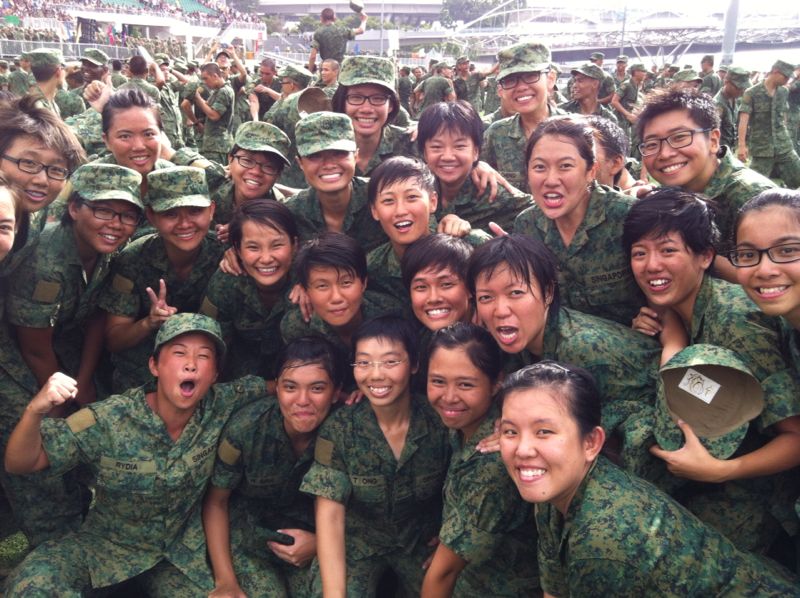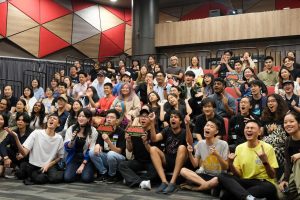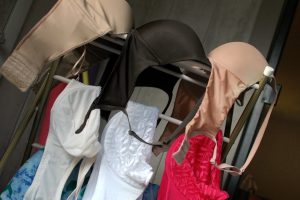All Image Credits to Elaine/Suzanna
When I first saw the casting call for Jack Neo’s film last October, I knew I had to write this piece. The role descriptions that were circulating on Twitter gave me no doubt that Neo would be hedging his CNY box-office on none other than a canvas of overplayed stereotypes and scraps of supposed female empowerment.
Now, before I go any further, let me be clear and say that if you are looking for a scathing review of the new Ah Girls Go Army (AGGA) film, you’ve come to the wrong place. Thankfully, Singaporeans’ media literacy and film tastes have progressed over the years and there are plenty of critics equating it to be as funny as a positive Covid-19 test.
What I did realise immediately was that Jack Neo, for all his faults, did pick a story that seems scarcely talked about in today’s media: the lived realities of the women serving our nation. Although his film may have been set in a fictional future where Singapore has no choice but to recruit women, it could have better resonated with ladies who chose to join our armed forces.
So if we can’t count on Neo to represent the women who are breaking their backs (yes backs, not nails) to defend our nation, I figured the readers of RICE could at least count on us to do that.
Real army women review AGGA
As neither a professional movie critic nor SAF regular, I could go on for another 1500 words about my thoughts and opinions on the movie.
However, a more spicy angle—as my editor puts it—would be to give you a short review in the style of infamous Youtube videos with clickbait-y titles like REAL ___ REVIEWS *insert movie/show related to their field*.
I spoke to ex-army regular Elaine about her experiences of being a woman in the SAF. Elaine joined the SAF at 18 years old when she realised that the SAF could sponsor your tertiary education.

“I don’t really know why I didn’t explore other options. Instead, I just went ‘okay let’s join the army’. I knew I wanted to study psychology in polytechnic and I’ve always been involved in NPCC and UGs (uniformed groups), so I thought, why not?”
As part of the interview, I had the privilege of spectating firsthand as she witnessed the travesty that was the trailer for this film.
Thirty seconds into the clip and Elaine’s eyes widen, jaw-dropping in such an animated way that makes cartoon characters’ expressions seem almost realistic.
“Oh come on,” she repeats a total of three times in those two and half minutes, each time with a glimmer of hope fading out her bespectacled eyes.
“I appreciate that they’re adding the Singaporean flavour with slang like ‘wake up your idea’ but excuse me ‘nails’?” she pauses, almost for dramatic effect as a bewildered countenance crosses her face. “Excuse me, ‘protect my face’? Like c’mon why are you painting the females to be so weak?”
After putting up with a rigorous military regime, being held to an equivalent standard to the men and even developing various psychosomatic symptoms from the stress of the army, watching this trailer felt like a disgrace to her experiences.
“I feel insulted by the whole ‘hanging underwear on the railing’ episode. Our regimen is so strict—of course, we’re familiar with basic rules like not hanging anything on the railings.”
Suzanna, on the other hand, cuts the film (or at least the trailer) a little more slack.
“Certain aspects of the video were quite difficult to believe,” begins the 29-year-old, “like the perfectly manicured nails and the girls being quite bimbotic. But I respect that it’s a movie so perhaps this was done to add colour to the whole thing and that it may appeal to some people’s humour.”
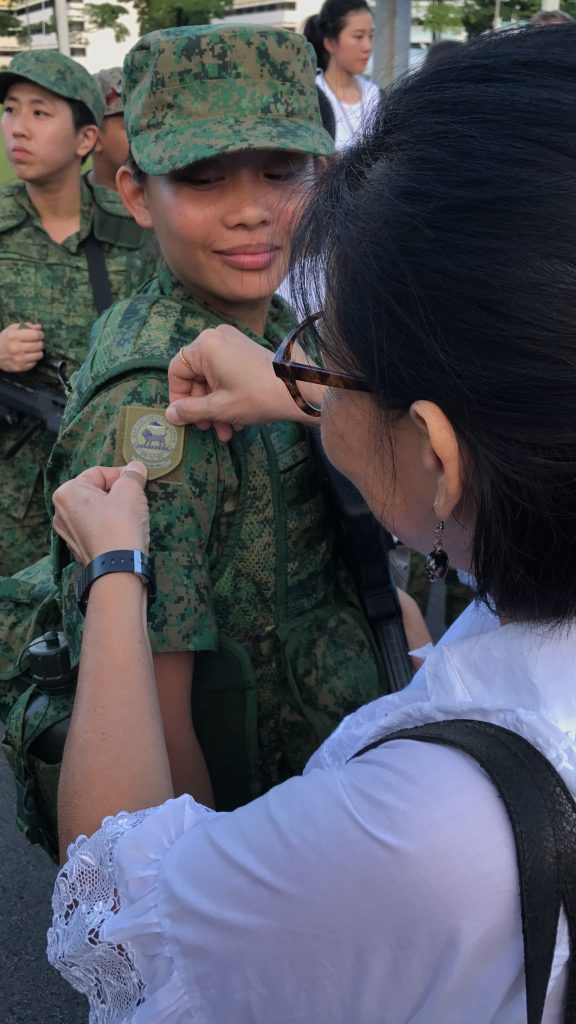
Having served in the SAFVC in its third year of operation in 2017, Suzanna could at least slightly empathise with the girls in the film in terms of how they bring their individual habits and norms into the army.
She pointed out bits from the film like gossiping or pointing out a “cute” sergeant as familiar occurrences even during her experience in SAF. It wasn’t her, of course, but it comes up now and then in the casual conversations amongst the female volunteers.
“But the movie is still quite off in that for most of us, when we enter a place like the SAF, would have altered our mindsets before going in. Most of us would be ready to follow procedures, come with trimmed nails, no polish, black hair and no bling everywhere.”
Although Suzanna was slightly more tolerant of the representations of women in the film, both she and Elaine at least agree that Jack Neo was definitely overdoing the bimbo-ness of the girls. They both saw through the exaggerated gimmicks and feeble attempts at humour as a far cry from their experiences.
“If the trailer is for a volunteer call,” added Suzanna, “then I think that it isn’t reflective at all of the reality of things.”
Expectations vs Reality
Unlike Jack Neo’s films, dated and stereotypical notions of women being incompatible with army life are a thing of the past if Suzanna and Elaine’s experiences are anything to go by. In fact, some women in uniform are held to a higher standard than men.
“You have to be fit (in the SAF). You can’t be overweight and I always felt my physical fitness wasn’t up to par,” Elaine shared.
She admitted that women’s IPPT standards were slightly different from men’s. They didn’t have to do the classic push-ups nor do they have to do pull-ups. But in terms of everything else, it was more or less the same for everyone. Same route march, same load to carry, same BMT.
However, she noted that the glaring differences in standards came when a woman was in a position of authority.
“The moment the guys see that it’s a female, I don’t know why, but they feel that there’s a need to challenge it.”
From the stories she had heard in other units, the female sergeants and leaders had a harder time earning their mens’ respect and making them listen.
“As a female,” emphasises Elaine, “you have to push yourself ten times harder to gain that respect. And you basically have to excel in all the tasks given to you better than the men themselves.”
I hesitantly asked what would happen if they couldn’t do that.
“When you fall short of what the men achieve, then you jeopardise the respect they have for you.”
It’s a chilling reality that subverts Neo’s archaic stereotypes of women. Although both narratives stem from a patriarchal understanding of women as inferior, Elaine’s insights highlight how women do not simply become the butt of a bad joke as a result of this. Instead, it’s the subtle yet solid glass ceiling coated in the foliage of Tekong and the tangled mangroves that trip women up and prevent them from rising.
Besides the gender “obey” gap, Elaine also tells me how sex jokes are a norm and it’s pretty much inevitable considering how male-dominated the SAF is.
Yet, overall, she still considers the SAF to be relatively understanding towards women despite these inherent biases.
Suzanna reaffirms this based on her experiences in the SAFVC. When she tells me about her time there, she is filled with nothing short of admiration and awe towards them.
“I wasn’t really treated any differently as a woman but I noticed that the men had it harder and were shouted at more. The leaders were all generally quite kind and mindful of how they spoke to the female recruits,” she recalled.
It’s a stark difference from Neo’s Sergeant Chow who spends most of the first 30 minutes of the film barking every command, feedback or punishment to the girls. Our real SAF men are more considerate though not without their flaws.
Fast and Victorious
Not only were the men in the army supportive of these ladies but so were their male friends, family members and for Elaine, her partner too.
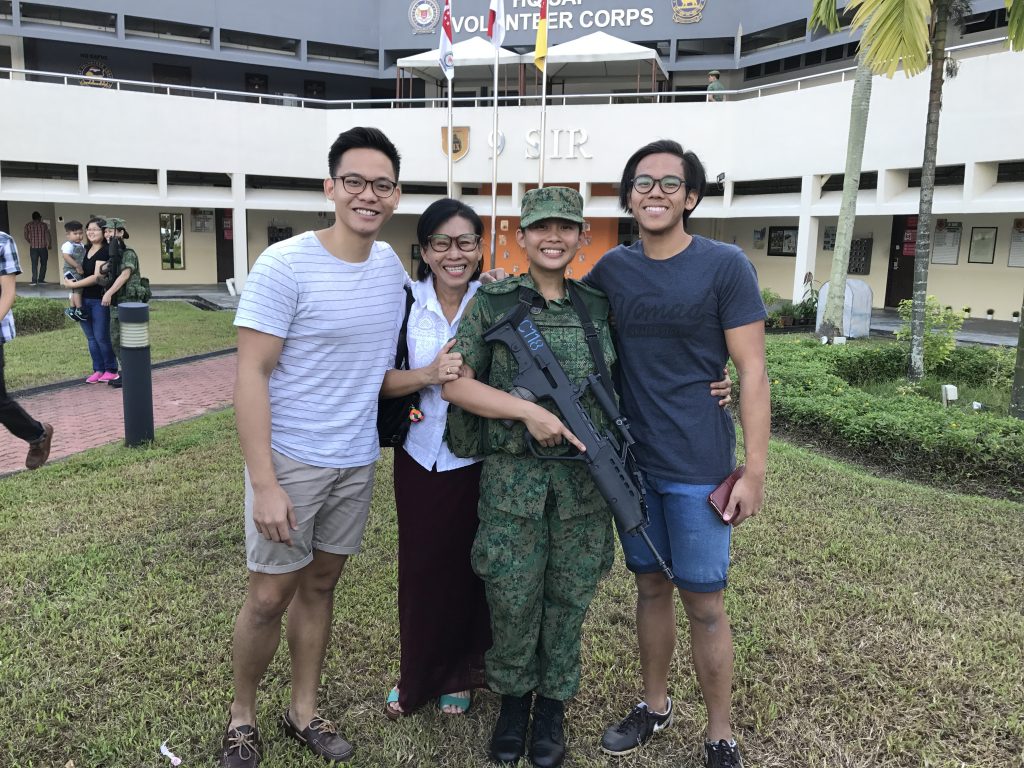
In a scene that could almost have been plucked from the original Ah Boys to Men film, Elaine describes her parents’ reactions to her decision to join the SAF:
“My dad doesn’t have a son and I still remember the beaming smile he gave me during my POP. It was probably the proudest he had ever been of me.”
As both ladies described their proudest milestones while in camp, I couldn’t help but picture them bounding through the Standard Obstacle Course to the tune of Mulan’s ‘I’ll Make a Man Out of You’ (Yes, I still prefer this far superior military melody over the aggravating earworm from Neo’s film).
Although the Disney song bears some patriarchal undertones, the accompanying montage and vibrato portraying Mulan’s struggles encapsulate the gravity of the hardships both Suzanna and Elaine experienced in the SAF.
To no one’s surprise, Neo’s film does little for minority representation beyond the token Malay and Indian characters. But I got the chance to hear about Suzanna’s experience as a Muslim woman fasting for half her time through BMT.
“They’d always ask anyone fasting to raise their hands, so I did,” said Suzanna with a smile.
And her hand was always the sole one raised, bobbing above the sea of green. To you and me, it sounds lonely to have to go through such a physically demanding experience alone, but Suzanna was grateful for her leaders who always checked in on her and her well-being.
To clarify, Suzanna wasn’t pressured to put herself through intense training without nutrients. In fact, despite being a competitive person, she had mentally prepared herself to break her fast if it ever got too taxing. Yet, it was a challenge she wanted to fulfil, and so she did.
“I got second place for my IPPT 1.6km run while I was fasting and it’s something I’m still quite proud of. But now, I may think twice about doing something like that. I’m a 29-year-old mother of two and I haven’t trained for quite a while.”
She adds a note about how she still felt that despite this example, it’s important for us to always listen to our body as different people may have different capacities. She still cares greatly about the importance of healthy and sustainable consumption of food, recently starting up Urban Origins last year.
As a fellow Muslim girl, I couldn’t help but look at Suzanna in awe. From the days I conveniently threw my Ramadan card for a free pass from PE or NAPFA training, what she did seem almost inconceivable.
It’s the kind of story I only wished Neo would have bothered including in his film instead of the two or three token lines bordering on performativism from his only Muslim character.
Ah Girls to Women?


Elaine (left) and Suzanna (right)
Elaine, on the other hand, shares a quintessential female battle while in the SAF: having her period during her specialist training in SCS.
“You’re in the middle of nowhere,” Elaine paints the scene. “You’re in a jungle, you’re carrying a heavy load, you have to go uphill and every inch of your body is going: I. Feel. Like. Giving. Up. But I just pushed and pushed through it till it became a defining moment for me. Now, when I look back I tell myself, ‘if I can go through this, I can go through anything.”
Funnily, I can’t help but to echo that last line by Elaine as I walked out of the movie theatre after finally watching AGGA with my colleague, Yulianna.
As I recall my unfortunate viewing of the film, I am unable to pinpoint any dramatic moment where the girls transformed from ditzy damsels to pillars of fortitude. There were no iconic ‘Ah Girls to Women’ moments like any of its predecessors in the franchise. And there were certainly no defining moments like Suzanna’s fasting or Elaine’s period march.
And that in itself speaks volumes to the kind of representation Neo relegated women to in the film. Setting aside all the not-so-subtle misogynistic humour, the whole movie was premised on the fundamental impression that women could not actually go through the army; that we’d somehow be in a worse form of misery than any man.
Even though Neo’s characters have redemption arcs and try to be more accommodating to or understanding of the struggles of the girls, there’s a pronounced undertone through it all: “we’re only doing this because the alternative is getting flamed by my in-charge or an unforgiving audience”.
Needless to say, regardless of Neo’s feeble attempts at damage control, the Singaporean audience has chosen its majority stand on this—save for the mysterious source of the $1 million contributed to the box office.
Why representation matters
In the grander scheme of things, Ah Girls Go Army will probably fade to both the recesses of our minds and the box office by the end of this month. After all, people rarely actively seek out the ABTM movies for a leisure watch (right?). It’s a transient blip in local movie history that would probably pass faster than the Omicron variant.
But the undeniable backlash Neo’s film is receiving from almost every direction it falls into seems to speak to a more pressing and possible everlasting impact of the film.
Various critics, both professional and casual movie-goers, have condemned the film in terms of both its consequences on the local film industry as well as how it harms society’s perceptions of women.
Personally, I think it does less for either of those things than we think. Most of us are wise enough not to take anything Jack Neo makes too seriously and the local film industry has plenty of other budding and contemporary filmmakers that can readily replace him.
Where I do think this film is detrimental is in a way that a lot of us may not actually resonate with and that is none other than representation. And I don’t just mean that of women in general.
For women like Suzanna and Elaine, this could have been the breakthrough moment. The point where the rest of us in society, of any gender, finally fully appreciate what they are doing and why they are doing it. It could have been the moment where girls who want to take a path like theirs feel inspired. A moment where women who still believe firmly that they shouldn’t have to do NS are convinced otherwise.
Instead, we clamour for an excuse, any excuse, to continue a prolonged Ah Boys to Men Cinematic Universe, which, let’s admit it, passed its expiry date at least two movies ago. Neo wastes the fresh, talented blood of brilliant thespians he employs to peddle a non-existent agenda that rings hollow in an age of empowerment. Strip all that away and what we are left with is the sad shell of a pseudo-female-empowerment film, half-baked from its production all the way to its humour. Sure it may have raked in S$1.67 million in earnings and vaguely captured the gist of SAF life for women, but, in the wise words of the comedian John Mulaney, “Just because you’re accurate, doesn’t mean you’re interesting.”

